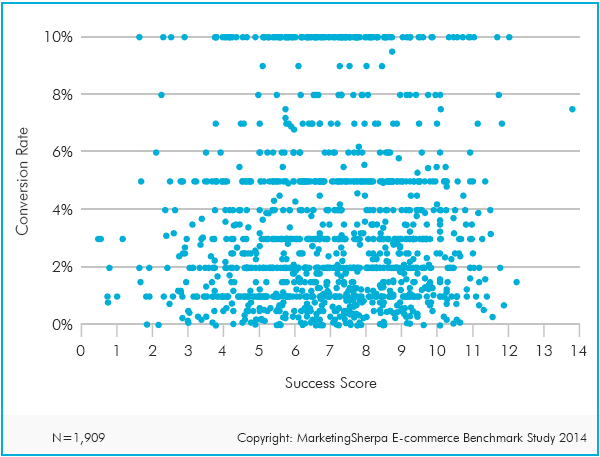by
Daniel Burstein, Director of Editorial Content
In the just-released
MarketingSherpa E-commerce Benchmark Study, made possible by a research grant from Magento, we share discoveries from a nine-month project focused on understanding what sets successful e-commerce companies apart from the pack.
While the final Benchmark Study is filled with 95 charts shaped around answering 25 core e-commerce questions, editing isn't just about what you put in — it also sometimes requires you to leave out some good information.
Below you'll see two charts, which did not make it into the final Benchmark Study, but were valuable enough to share with you today.
Comparing conversion and success
To make these charts, we compared companies' stated conversion rates for e-commerce sales against a weighted success score created by Diana Sindicich, Senior Manager, Data Sciences, MECLABS (parent company of MarketingSherpa). The success score includes factors like financial metrics, and you can read more about it in the Benchmark Study.
The big discovery from these charts is:
Conversion rates for e-commerce sales do not necessarily correlate to success
As you can see below, the data point dots are all over the place. This is counterintuitive for many. Most marketers (myself included) would likely expect to see a clear trend with a diagonal line from lower left to upper right showing that the companies with lower conversion rates were less successful, and higher conversion rates were more successful.
This lack of correlation was evident in conversion rates less than 10% and conversion rates less than 1%.
Comparing conversion and success for conversion rates under 10%

Click here to see a printable version of this chart
A lack of correlation between conversion rate and success score appears to hold true for conversion rates less than 10%.
Comparing conversion and success for conversion rates under 1%

Click here to see a printable version of this chart
Even at the less-than-1% level, increased conversion does not correlate with a perception of increased success.
Marketers often ask us: What should my conversion rate be?
MarketingSherpa is certainly behind the growing movement of marketers focused on conversion rate optimization.
Many marketers responded to the Benchmark Survey with tips for improved conversion, such as, "We have seen improvements in the conversion rates by reducing clicks and improving CTAs. Instead of 'View,' we used 'Buy' and that proved to be a stronger CTA for conversions."
But let's not overlook that fact that conversion rates themselves are not success. The biggest takeaway from these charts is:
While conversion rates for e-commerce sales are a goal, they are rarely the overall goal
At first, it would seem counterintuitive that conversion rates don't necessarily correlate to success. After all, you can see for yourself in the above chart how a company with an average conversion rate of 10% had a success score less than 2 while a company with a conversion rate of 0.2% had a success score of more than 10.
But consider this — the overall goal for a company is to turn a profit.
By overly focusing on conversion rates, we may seek to juice sales at the expense of overall success, either intentionally or unintentionally.
Four reasons your conversion rates for e-commerce sales could undercut your overall success
- You could pay high commissions through affiliate marketing.
- You could undercut your competitors on price to grab market share.
- You can overuse incentives. I like to call incentives "the bacon of marketing tactics." Much like bacon will make almost any dish taste better even if the chef is lousy, incentives can help boost sales even if the product and marketer do not have a value proposition. A great example is American car companies before the Great Depression. They were literally paying people to purchase the product.
- Your pricing could simply be wrong.
It reminds me of an owner of an e-commerce store who was excited about all the sales she was making. That was until her accountant looked in her books and she realized she was losing money on each sale — another version of paying customers to purchase.
All could produce high conversion rates, but with low success.
Add this to the fact that conversion rates will vary greatly by industry, product, type of conversion, company and even buyer persona.
It's all relative
This isn't to say conversion rates aren't important. By spotting questionable conversion rates, and using conversion rate optimization to improve them, marketers are improving overall results.
This is just a word of caution — don't lose sight of the big picture when optimizing for conversions. Also, do not become jealous of other companies' conversion rates.
However,
relative conversion trends can be very insightful.
"Sustained changes in conversion rate could be the result of changes to the site, shifts in SEO performance, the impact of a marketing campaign, or the result of an outside influence like a news story," Sindicich said. "Conversion rate should be monitored in context of revenue and margins to ensure that changes are improving the bottom line."
Related Resources
Download your free copy of the MarketingSherpa E-commerce Benchmark Study — Made possible by a research grant from Magento
The downside of very high conversion ratesMarketing Research Chart: Critical website conversion path elementsMarketing Research Chart: Conversion rates on organic traffic











